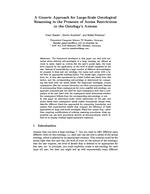A Generic Approach for Large-Scale Ontological Reasoning in the Presence of Access Restrictions to the Ontology's Axioms
Aus International Center for Computational Logic
A Generic Approach for Large-Scale Ontological Reasoning in the Presence of Access Restrictions to the Ontology's Axioms
Franz BaaderFranz Baader, Martin KnechtelMartin Knechtel, Rafael PeñalozaRafael Peñaloza
Franz Baader, Martin Knechtel, Rafael Peñaloza
A Generic Approach for Large-Scale Ontological Reasoning in the Presence of Access Restrictions to the Ontology's Axioms
In Abraham Bernstein et al., eds., Proceedings of the 8th International Semantic Web Conference (ISWC 2009), volume 5823 of Lecture Notes in Computer Science, 49-64, 2009
A Generic Approach for Large-Scale Ontological Reasoning in the Presence of Access Restrictions to the Ontology's Axioms
In Abraham Bernstein et al., eds., Proceedings of the 8th International Semantic Web Conference (ISWC 2009), volume 5823 of Lecture Notes in Computer Science, 49-64, 2009
- KurzfassungAbstract
The framework developed in this paper can deal with scenarios where selected sub-ontologies of a large ontology are offered as views to users, based on criteria like the user's access right, the trust level required by the application, or the level of detail requested by the user. Instead of materializing a large number of different sub-ontologies, we propose to keep just one ontology, but equip each axiom with a label from an appropriate labeling lattice. The access right, required trust level, etc. is then also represented by a label (called user label) from this lattice, and the corresponding sub-ontology is determined by comparing this label with the axiom labels. For large-scale ontologies, certain consequence (like the concept hierarchy) are often precomputed. Instead of precomputing these consequences for every possible sub-ontology, our approach computes just one label for each consequence such that a comparison of the user label with the consequence label determines whether the consequence follows from the corresponding sub-ontology or not. In this paper we determine under which restrictions on the user and axiom labels such consequence labels (called boundaries) always exist, describe different black-box approaches for computing boundaries, and present first experimental results that compare the efficiency of these approaches on large real-world ontologies. Black-box means that, rather than requiring modifications of existing reasoning procedures, these approaches can use such procedures directly as sub-procedures, which allows us to employ existing highly-optimized reasoners. - Forschungsgruppe:Research Group: AutomatentheorieAutomata Theory
@inproceedings{ BaKP-ISWC-09,
author = {Franz {Baader} and Martin {Knechtel} and Rafael {Pe{\~n}aloza}},
booktitle = {Proceedings of the 8th International Semantic Web Conference (ISWC 2009)},
editor = {Abraham Bernstein et {al.}},
pages = {49--64},
series = {Lecture Notes in Computer Science},
title = {A Generic Approach for Large-Scale Ontological Reasoning in the Presence of Access Restrictions to the Ontology's Axioms},
volume = {5823},
year = {2009},
}
